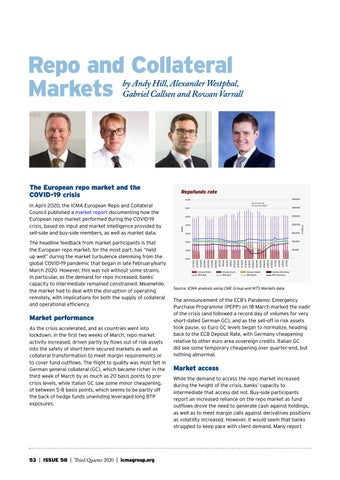Repo and Collateral Markets
by Andy Hill, Alexander Westphal, Gabriel Callsen and Rowan Varrall
The European repo market and the COVID-19 crisis
Repofunds rate
In April 2020, the ICMA European Repo and Collateral Council published a market report documenting how the European repo market performed during the COVID-19 crisis, based on input and market intelligence provided by sell-side and buy-side members, as well as market data. The headline feedback from market participants is that the European repo market, for the most part, has “held up well” during the market turbulence stemming from the global COVID-19 pandemic that began in late February/early March 2020. However, this was not without some strains. In particular, as the demand for repo increased, banks’ capacity to intermediate remained constrained. Meanwhile, the market had to deal with the disruption of operating remotely, with implications for both the supply of collateral and operational efficiency.
Market performance As the crisis accelerated, and as countries went into lockdown, in the first two weeks of March, repo market activity increased, driven partly by flows out of risk assets into the safety of short-term secured markets as well as collateral transformation to meet margin requirements or to cover fund outflows. The flight to quality was most felt in German general collateral (GC), which became richer in the third week of March by as much as 20 basis points to precrisis levels, while Italian GC saw some minor cheapening, of between 5-8 basis points, which seems to be partly off the back of hedge funds unwinding leveraged long BTP exposures.
53 | ISSUE 58 | Third Quarter 2020 | icmagroup.org
Source: ICMA analysis using CME Group and MTS Markets data
The announcement of the ECB’s Pandemic Emergency Purchase Programme (PEPP) on 18 March marked the nadir of the crisis (and followed a record day of volumes for very short-dated German GC), and as the sell-off in risk assets took pause, so Euro GC levels began to normalize, heading back to the ECB Deposit Rate, with Germany cheapening relative to other euro area sovereign credits. Italian GC did see some temporary cheapening over quarter-end, but nothing abnormal.
Market access While the demand to access the repo market increased during the height of the crisis, banks’ capacity to intermediate that access did not. Buy-side participants report an increased reliance on the repo market as fund outflows drove the need to generate cash against holdings, as well as to meet margin calls against derivatives positions as volatility increased. However, it would seem that banks struggled to keep pace with client demand. Many report







